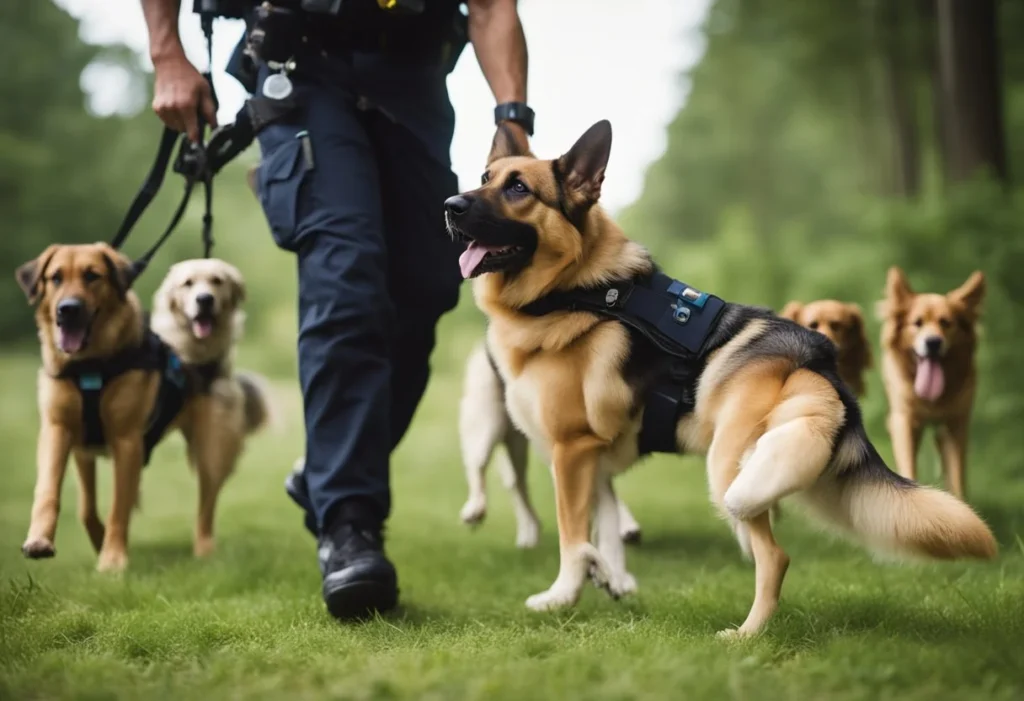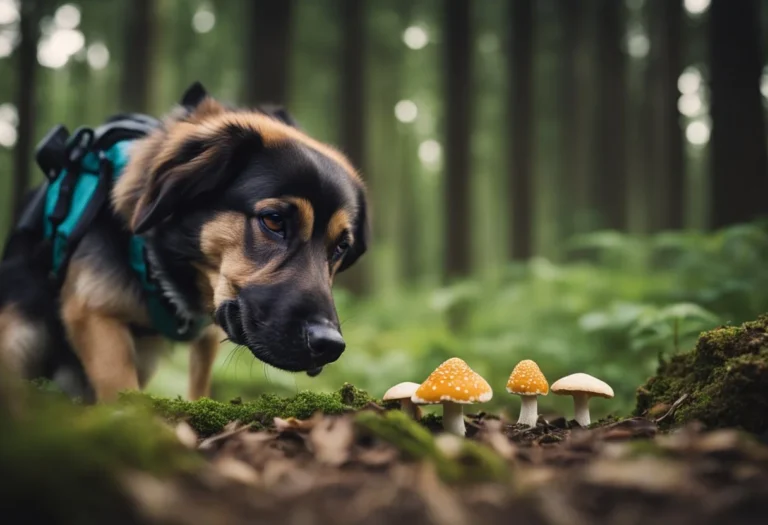Drug dogs are specially trained canines that are used to detect illegal drugs, firearms, and explosives. These dogs have an incredible sense of smell and can detect even the slightest odor of drugs or explosives.
Drug dogs are trained using positive reinforcement techniques to associate the smell of drugs with a reward, such as a toy or food. They are trained to alert their handlers when they detect the odor of drugs or explosives.
Drug dogs are used in a variety of settings, including airports, border crossings, and police investigations. They are often used to search vehicles, luggage, and packages for illegal drugs.
While drug dogs are highly effective at detecting drugs, they are not infallible. They can sometimes be distracted by other smells or become tired after extended periods of searching. Additionally, drug dogs may alert to the odor of legal substances, such as prescription medications or even food items.
In conclusion, drug dogs are an important tool in the fight against illegal drugs and explosives. While they are not perfect, their highly developed sense of smell makes them a valuable asset in law enforcement and security settings.
Contents
- 1 Training of Drug Dogs
- 2 Detection of Specific Substances
- 3 Limitations and Challenges in Training
- 4 Can Drug Dogs Detect Mushrooms
- 5 Psilocybin Mushrooms
- 6 Commonly Used Techniques
- 7 Legal and Ethical Considerations
- 8 Privacy Concerns
- 9 False Positives
- 10 Scientific Studies and Research
- 11 Effectiveness of Drug Dogs
- 12 Research on Mushroom Detection
Training of Drug Dogs

Drug dogs are highly trained to detect specific substances, including cocaine, heroin, and marijuana. However, training drug dogs to detect mushrooms is not a common practice.
Detection of Specific Substances
Drug dogs are trained to detect the odor of specific substances by using their highly sensitive sense of smell. During training, dogs are exposed to the scent of the substance they will be detecting. They are then rewarded when they correctly identify the scent.
In addition to detecting the scent of drugs, drug dogs can also detect the scent of drug paraphernalia, such as pipes and bongs. This is because the paraphernalia can absorb the scent of the drug and retain it for a period of time.
Limitations and Challenges in Training
Training drug dogs to detect mushrooms presents some challenges. Mushrooms have a unique odor that is different from that of drugs. Additionally, there are many different types of mushrooms, each with their own distinct odor.
Another challenge in training drug dogs to detect mushrooms is that the odor of mushrooms can be masked by other scents. For example, if mushrooms are stored with other strongly scented items, such as spices or perfumes, the scent of the mushrooms may be difficult for the dog to detect.
Overall, while drug dogs are highly trained to detect specific substances, training them to detect mushrooms presents unique challenges. It is not a common practice and is not typically included in drug dog training programs.
Can Drug Dogs Detect Mushrooms
Drug dogs are highly trained to detect various types of narcotics and illegal substances. They are often used by law enforcement agencies to help identify drug traffickers and prevent the distribution of illegal drugs. However, can drug dogs detect mushrooms, specifically psilocybin mushrooms, which are known for their psychedelic properties?
Psilocybin Mushrooms
Psilocybin mushrooms, also known as magic mushrooms, are a type of fungus that contain the psychoactive compound psilocybin. These mushrooms are often consumed for recreational and spiritual purposes, and their use is illegal in many countries.
According to experts, drug dogs can detect psilocybin mushrooms, but they are not always trained to do so. This is because psilocybin is not considered a narcotic and is not classified as a controlled substance in many countries. Therefore, some drug dogs may not be trained to detect it.
However, some law enforcement agencies may train their drug dogs to detect psilocybin mushrooms, especially in areas where their use is prevalent. This allows the dogs to identify individuals who may be in possession of illegal substances, including psilocybin mushrooms.
Commonly Used Techniques
Drug dogs are trained to detect illegal substances using a variety of techniques. One of the most common techniques is called passive alert. With this technique, the dog will sit or lie down when it detects the scent of an illegal substance. This allows the handler to identify the location of the substance without the dog disturbing it.
Another technique is called active alert. With this technique, the dog will scratch or paw at the location where it detects the scent of an illegal substance. This technique is often used when the substance is hidden or concealed.
Drug dogs may also be trained to detect the scent of illegal substances in different environments, such as vehicles, luggage, and buildings. They may also be trained to detect the scent of illegal substances on individuals, including their clothing and belongings.
In conclusion, drug dogs can detect psilocybin mushrooms, but their ability to do so may depend on their training and the laws in their jurisdiction. It is important to note that the use of psilocybin mushrooms is illegal in many countries, and individuals found in possession of these mushrooms may face legal consequences.
Legal and Ethical Considerations
Privacy Concerns
Drug dogs have been used by law enforcement agencies for decades to detect illegal substances such as cocaine, heroin, and marijuana. However, the use of drug dogs to detect mushrooms raises privacy concerns. Mushrooms are legal in some states for medicinal and recreational use. Therefore, the use of drug dogs to detect mushrooms could lead to unnecessary searches and seizures, violating the Fourth Amendment of the United States Constitution.
Moreover, drug dogs are not always accurate in detecting mushrooms. They may alert to the presence of legal mushrooms, leading to unnecessary searches and seizures. This could result in innocent people being subjected to invasive searches and seizures without probable cause.
False Positives
Drug dogs are trained to detect a specific scent associated with illegal drugs, but they are not infallible. They can be influenced by a variety of factors, including the handler’s behavior, the environment, and the presence of other scents. This can lead to false positives, where a drug dog alerts to the presence of drugs when there are none.
False positives can have serious consequences, including innocent people being subjected to invasive searches and seizures. Therefore, it is important for law enforcement agencies to ensure that drug dogs are properly trained and that their alerts are verified by other means before taking action.
In conclusion, while drug dogs can be an effective tool for detecting illegal drugs, their use to detect mushrooms raises legal and ethical concerns. Law enforcement agencies must ensure that drug dogs are properly trained and that their use is in compliance with the law to avoid violating individuals’ privacy rights.
Scientific Studies and Research
Effectiveness of Drug Dogs
Drug dogs have been used for years to detect illegal substances, but can they also detect mushrooms? According to scientific studies, drug dogs are highly effective in detecting the scent of mushrooms. In fact, drug dogs are trained to detect a wide range of scents, including mushrooms, which contain psilocybin, a psychoactive compound that can cause hallucinations.
Drug dogs are trained to detect scents using their powerful sense of smell. They are able to detect even the smallest amounts of drugs, including mushrooms. When a drug dog detects a scent, it will alert its handler by sitting or scratching at the location where the scent is coming from.
Research on Mushroom Detection
Research has shown that drug dogs are highly effective in detecting the scent of mushrooms. In a study conducted by the University of South Florida, drug dogs were able to detect the scent of mushrooms with an accuracy rate of over 90%. The study also found that drug dogs were able to detect the scent of mushrooms even when they were mixed with other scents.
Another study conducted by the University of California, Davis, found that drug dogs were able to detect the scent of mushrooms at a distance of up to 15 feet. This means that drug dogs can detect mushrooms even if they are hidden or concealed.
Overall, scientific studies and research have shown that drug dogs are highly effective in detecting the scent of mushrooms. This makes them an important tool in law enforcement efforts to combat the use and distribution of illegal substances.
Meet the Author Mehmood Shah,
As an owner of Rottweiler for 10 years, I motivate and encourage people about this lovely breed.
We’re dedicated to providing you the detailed researched articles about Rottweiler, with an emphasis on Rottweiler Health, Training, and Exercises.
I started my journey with Rottweiler Time in 2021 and it has come a long way from its beginnings.
Thanks for Your Support.


